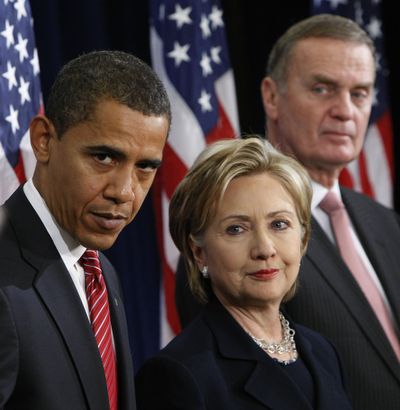New security team faces ‘urgent’ issues
Obama announces group made of ‘strong personalities’

WASHINGTON – President-elect Barack Obama’s high-powered national security team, introduced Monday at a Chicago news conference, faces the challenge of managing two wars and various ongoing foreign policy crises even as it helps the president-elect shape what he called “a new beginning, a new dawn of American leadership” in the world.
In announcing his choices of Sen. Hillary Rodham Clinton, D-N.Y., to be secretary of state, Defense Secretary Robert Gates to continue in office and Ret. Marine Gen. James Jones to serve as national security adviser, Obama laid out a vision of an America whose global stature is restored and whose military, diplomatic and economic power are balanced with one another and with “the power of our moral example.”
But he acknowledged that “grave” and “urgent” national security issues, including the wars in Iraq and Afghanistan, potential conflict between Pakistan and India, and economic crisis at home and abroad, require immediate attention. The challenge will be balancing those immediate priorities handed over by the Bush administration – what the Obama camp calls the “inheritance issues” – with national and international expectations for the longer-term changes he pledged during the campaign.
The members of his new team, Obama said Monday, “share my pragmatism about the use of power, and my sense of purpose.” Three other Cabinet selections announced were Eric Holder as attorney general, Arizona Gov. Janet Napolitano as secretary of homeland security and Susan Rice as U.S. ambassador to the United Nations.
In addition to the pressing issues in Iraq, Afghanistan, Pakistan and India, Obama must quickly decide whether to continue negotiations begun by President Bush on North Korea and the Israeli-Palestinian conflict, how to deal with Iran, and what to do about the U.S. detention facility at Guantanamo Bay, Cuba.
At Monday’s news conference, however, questions focused less on policy than on how the eclectic personalities standing behind Obama and in front of American flags – particularly Clinton, Gates and Jones – would mesh. Asked how he would avoid having a “clash of rivals” rather than the smoothly functioning team he portrayed, Obama said he expected “vigorous debate” and described himself as “a strong believer in strong personalities and strong opinions.”
“One of the dangers in the White House, based on my reading of history,” Obama continued, “is that you get wrapped up in groupthink and everybody agrees with everything and there’s no discussion and there are no dissenting views.”
“On the broad core vision of where America needs to go,” he said, “we are in almost complete agreement. There are going to be differences in tactics and different assessments and judgments made. That’s what I expect; that’s what I welcome. That’s why I asked them to join the team.”
“But understand, I will be setting policy as president,” he added. “I will be responsible for the vision that this team carries out, and I expect them to implement that vision once decisions are made.”